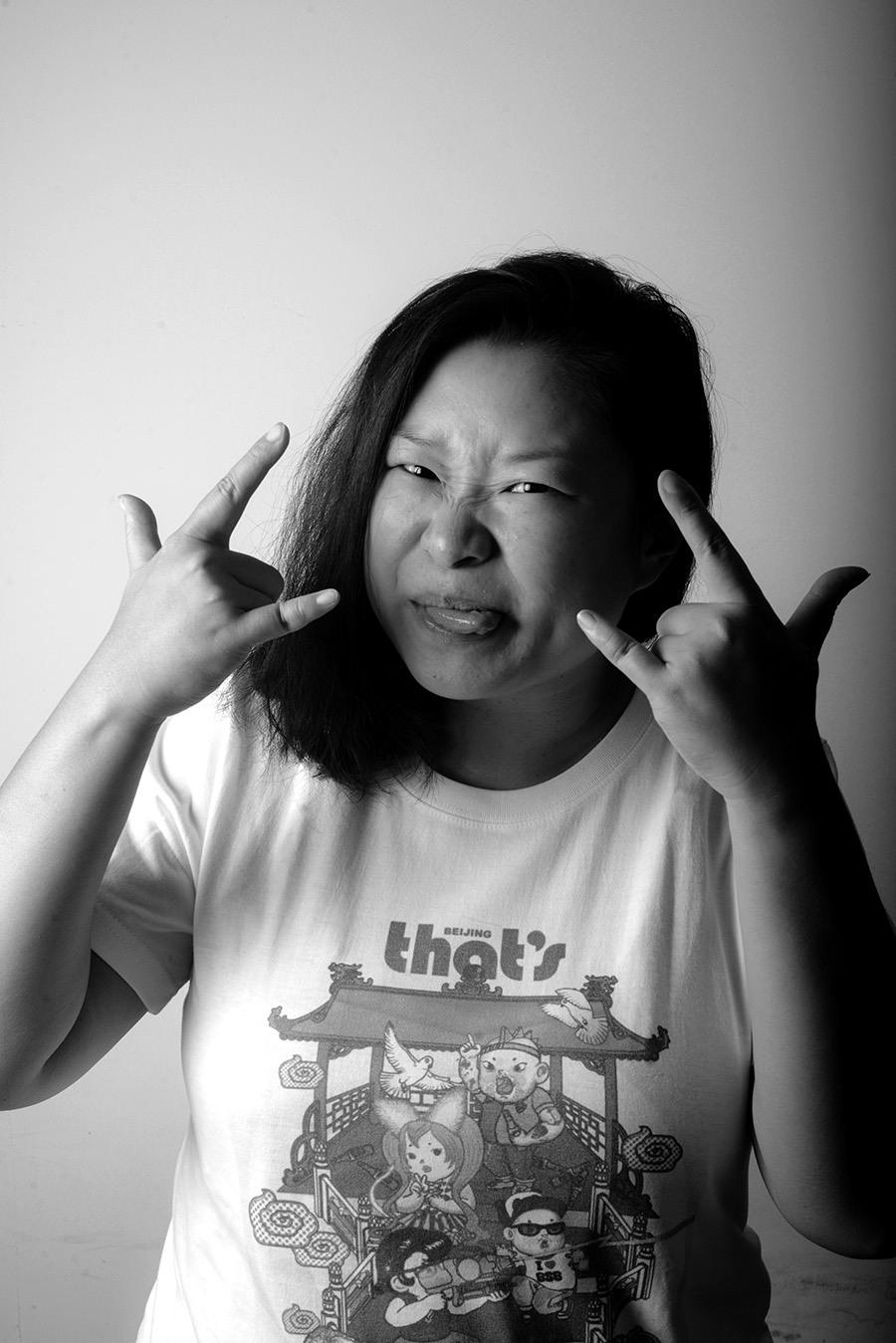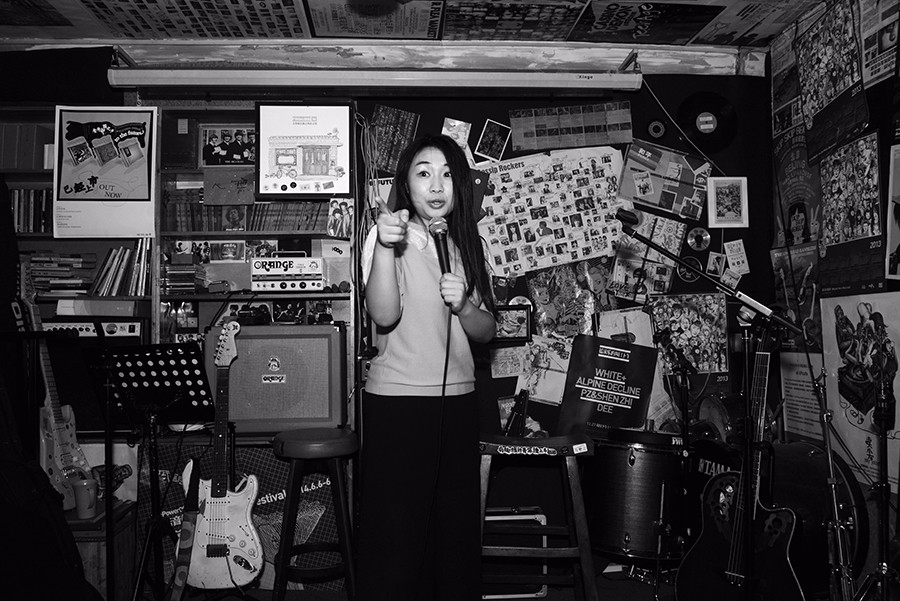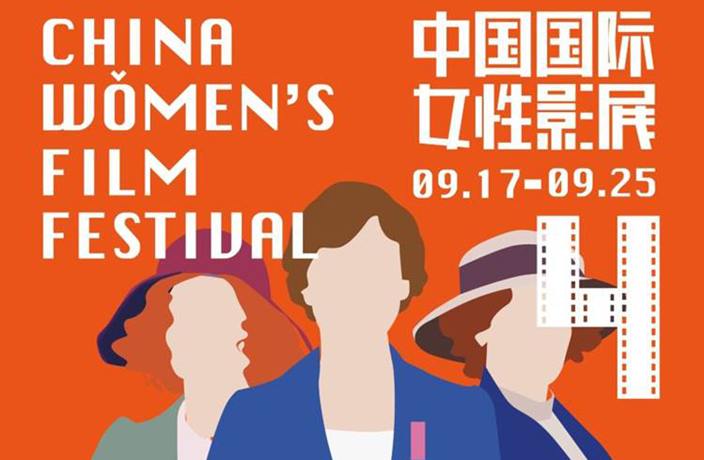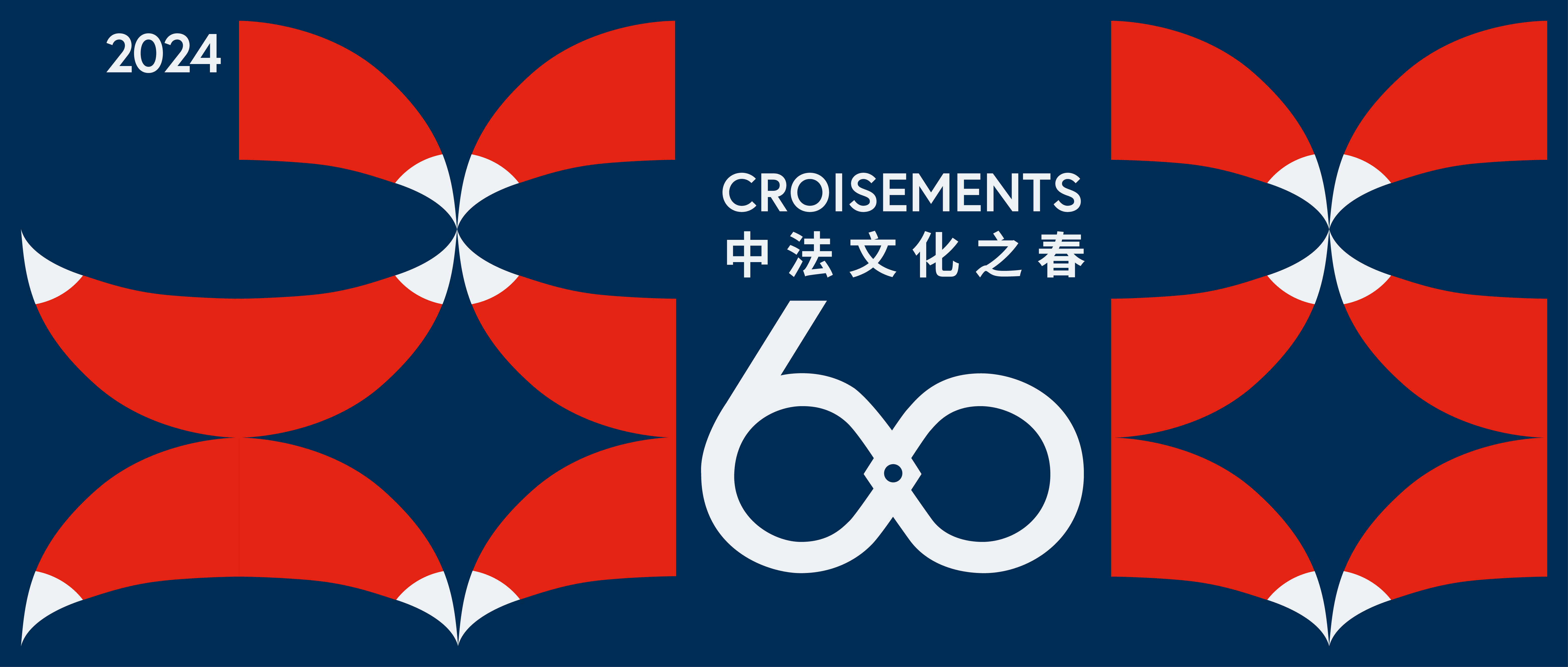The following is a conversation I overhear in a bar before a comedy night in Beijing.
Male comedian: I’m Kei [pronounced ‘K’].
Female audience member: I’m L.
Male comedian: Huh, we both have weird initial names.
Female audience member: Oh, no, my name’s Lexi. I thought we were doing a little thing.
Her response is funnier than any of the material performed on stage that night. Yet in Beijing’s – and everywhere else's – traditionally patriarchal comedy scene, it still seems that it's the men outnumbering women on stage.
“Performing comedy is a matter of not giving a fuck,” says teacher-by-day, comedian-by-night Kyrie Gray, in between referencing Amy Schumer and the open mic comedy scene in Beijing.

Above and below: Kyrie Gray shows us her funny sides.
Gray and I are ‘sipping tea’ in a hutong cafe – which, for those unaware, means we are engaging in some high-quality discourse. The topic is female comics in China and Gray is offering advice.
“When you’re on stage you have to be very confident. Like, trust me on this guys,” she says. “You can’t appear uncomfortable because then [the audience] becomes uncomfortable.”
The Portland transplant has been a member of Beijing’s English-language stand-up scene since its early days in 2013. It was during this time that several disconnected groups joined to form premier comedy clubs. As such, Gray has seen it – and them – all. “A small handful of people have been [performing] here for a long time [but] it’s still primarily white males. And that’s true all over the world.”
She’s right. If an international comedy ‘hall of fame’ existed, it would consist primarily of white dudes: George Carlin, Louis C.K., Mitch Hedberg, Woody Allen, Ricky Gervais, and... you get the point.
In Beijing’s English-language scene specifically, Gray attributes the White Dude Phenomenon to the demography of the English-speaking community. “The easiest jobs to get here are if you’re white,” she offers.
“The guy comedians here are very close friends. It’s not sexist,” she adds. “They’re not slapping our asses backstage and saying ‘make me a sandwich.’ But I think we just need more women to come and do it and then there’ll be more of a female support network.”
Getting on stage is hard enough but that may be the easiest part. As Gray states: “[Comedian] Tina Fey recently did an interview in Elle where she said it’s a terrible time for women in comedy because, as a woman, you have to do really, really well to get the same attention as guys who can be kind of shit. It’s just a fact. You have to step it up when you’re doing comedy.
“It’s sad for now. But eventually [female comedians] will be the new normal.”

Gray is working hard to make this happen. Earlier this year she founded an all-female improv group called Beijing Broads. Made up of women from a mix of backgrounds, the group performs every month.
“I saw there was a need,” Gray explains. “Beijing Broads is a way to showcase feminist humor and strong females. We can build whatever character [we want] or play men. It’s nice not having that pressure where you feel like you have to play the romantic lead. We can make period jokes and not make anyone uncomfortable.”
It shouldn’t be a big deal, but it is. “We are still a minority here,” Gray reiterates. “And we have a specific point of view.”
The group has performed a handful of times but are already a hit with audiences. And while they're currently on summer break, there are plenty of other shows happening around the city. These include open mics, showcase and improv events – in English and Chinese – at venues such as The Bookworm, Cheers, 69 Café and Paddy O’Shea’s.
And of course, there’s the ever-popular Hot Cat Club open mic, hosted by Comedy Club China (CCC).
I check out one of their Wednesday night shows on Fangjia Hutong and find Hot Cat buzzing as a mix of young and old, expat and local, anticipate two hours of open mic stand-up, beers in hand.
Jennifer Hsiung performs second. She appears self-assured, cracking jokes about the host and impersonating a Spanish pilot. She has a background in acting and media, and it shows.

Jennifer Hsiung performs stand-up at an open mic night.
But performing at Hot Cat can be difficult, as Hsiung tells me later: “It’s different to other open mics in that it actually feels like everyone is gathered there to watch a rock band. It feels like a show, when really it’s an open mic. There’s freakin’ spotlights shining on you, you’re on an elevated stage and there’s a bunch of people in the crowd you can’t see, so the pressure of performing is two-fold.”
Apart from Hsiung, there are two other female performers that night. That’s out of 15, though. The crowd cheers when a male Chinese comedian takes to the stage (chanting his name: "Guo! Guo! Guo!"), but where are the female Chinese comedians? I wonder.
“Some Chinese local girls are pretty funny too. It’s just the language barrier – English being their second language,” Hsiung explains. “I was intimidated when I first came [to Hot Cat]. So, for a local girl to get up there, it’s especially intimidating.”
But there are exceptions.
Enter Mia Li. Before we meet she mistakes me for a guy (“I asked that man in the blue shirt if he was ‘Dom’ [laughs]”) but this is fine because – apart from the fact that my name is gender-neutral – she is very, very funny.

Mia Li strikes a pose.
Li is from Shandong but speaks English in an American accent, due to hours of YouTube-watching in the pre-Firewall days. She is a pioneer of the stand-up scene, helping form CCC in 2013 (“I call myself one of the founding members”).
Her sets can be found on YouTube, where she uses wordplay and pokes fun at her Chinese heritage. For Li, comedy and life are one and the same: “It’s a coping mechanism. Because whatever misery I’m in, I can just laugh. That’s the only way for me to deal with it.”
Li performs in English but is well aware of the Chinese stand-up scene, of which she is both effusive (“They're really good. When I go to their shows, I’m always so impressed”) and critical, noting: “One thing that bothers me a lot, is that guys are being judged on whether they’re funny or not, whereas girls are still being judged on whether they’re pretty or not.”
She shares an example of a Chinese show’s promotion material advertising its line up as including, “two beautiful women.”
“These are professional stage actors – one with a Peking opera background – yet they’re still trying to sell how pretty the girls are instead of how funny,” Li says incredulously.
It’s complicated, admits professional Chinese comedian Jeff Shi. He explains: “A major point that comedians use is saying something against themselves or their own appearance in general. Performing on stage, you have to have the same ideology as your audience in order to create a connection. If a very beautiful girl gets on stage and starts talking shit about herself, the Chinese audience will think, ‘wow, this girl is crazy.’
“I’m not necessarily talking about ‘beauty’ as in appearance. It’s about social standards or behavior – a ‘well-behaved’ female is not funny in Chinese comedy.”
So, what is funny? The Lunar New Year Gala in 2015 was reportedly the most-watched TV show in the world. The annual show heralds the New Year with skits and songs celebrating elements of Chinese culture. But in 2015, the show attracted additional attention for its “poisonous” spoofs degrading women.
It’s hard to believe that sketches comparing unmarried ‘manly women’ and ‘goddesses’ (as the Gala’s did) can pass on national television in this modern age, and indeed there was uproar from viewers resulting in a petition for the show to be taken off the air.
“Of course this way of thinking is sexist,” Shi says. “I think it will change gradually. But it’s up to comedians [and writers] to change these ideas. [Comedian] Joe Wong and I are creating several female comedian parts. We really need more women working with us. We welcome them.”
Shi recently performed at 69 Café with two other male comics. The show was a hit, with the mostly Chinese audience bursting into laughter with every joke. Host Xiaolu introduced each act, creating her own laughs in between.

Xiaolu hosts a comedy showcase at 69 Cafe.
Xiaolu has been performing stand-up comedy for the past two years and enjoys hosting, even if it’s for a lineup of males, she says. “I feel good. It’s very interesting because the audience can find out the differences between men and women [comedians]. I like to make jokes about the guys [I host].”
The lawyer is also a formidable comic in her own right, name-checked by Shi as one of the best. “I’m more popular than [the guys],” she laughs, before adding seriously, “This is not a joke.”
Yet Xiaolu admits experiencing double standards while performing (although in the opposite sense of those sentiments expressed by Gray earlier), saying: “It’s easier to be a female comedian because the audience doesn’t expect a really good set. If you can give one, they’ll think you are fantastic.”
Another Chinese female comedian navigating the Chinese stand-up scene is Cai Yilin. Like Xiaolu, Cai has spent the past two years working the stand-up crowd, although recently less so.
“This year it’s been hard,” she admits. “I don’t know what else to talk about. Before, a lot of my material revolved around me being single, but now I have a boyfriend. This topic is very common, especially in Chinese stand-up, but it’s too easy and that’s why I stopped. I think the jokes are getting boring.”
Cai echoes Shi’s previous thought regarding accountability. “I think female comedians restrict their own material into certain fields. I’ve never been treated unequally. As comedians we have the responsibility to break down the stereotypes but right now I think we are reinforcing them, so it’s not good.”
With the right material, Cai loves performing, as “it’s kind of like therapy.” She views stand-up as an emerging branch in Chinese comedy, the foundation being crosstalk, a traditional Chinese comedic performance. Whereas stand-up is a solo affair, crosstalk typically involves a dialogue between two performers, packed with innuendos and allusions, and often to music.
Crosstalk has been around since the mid-1800s whereas stand-up is a relatively new import. Cai says: “Stand-up is getting more popular in China but the audience is still very small. Most of my friends didn’t know about it before I told them because it’s a Western form of performance.
“Crosstalk is scripted and the scripts can be used for a very long time. When I watch crosstalk shows I don’t feel a connection with the performers. Whereas when I first started doing stand-up, the shows were like AA (Alcoholics Anonymous) meetings,” she laughs.
Although many shows and writers, including Shi, are on the hunt for more female writers, Cai isn’t moved. She says pragmatically: “Being a full-time comedian would be very stressful. I don’t want to turn my hobby into something that I hate.”
Images by Holly Li
Disclaimer: Mia Li contributes a monthly feature to That’s Beijing, titled ‘Chinese Urban Dictionary.’





















0 User Comments